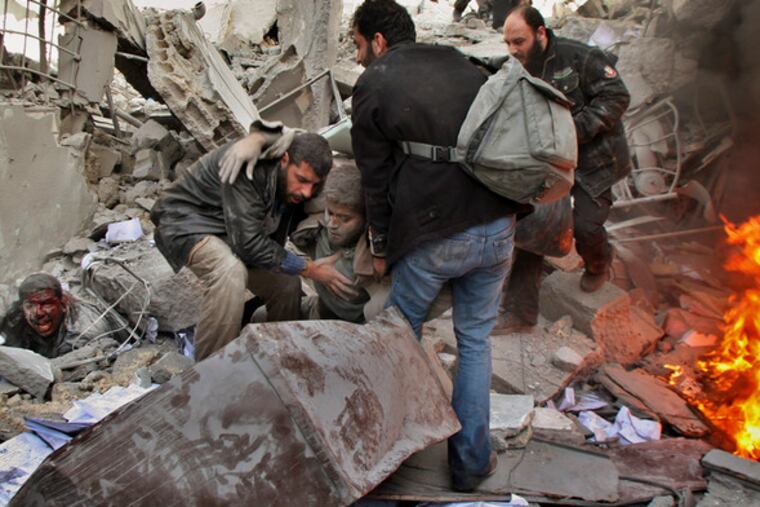Israel prepares for Gaza invasion
Air strikes went on, and the military readied a possible ground offensive in a bid to destabilize Hamas.

JERUSALEM - Israel began preparing yesterday for a possible ground offensive into the Gaza Strip as its air force continued to pummel the Hamas-controlled region with dozens of missile strikes in a "shock and awe" operation that has killed more than 290 Palestinians and wounded more than 800 in two days.
The Israeli military campaign, an attempt to destabilize the extremist Islamic group that controls Gaza, is the biggest and deadliest there since Israel seized control of the region on the Mediterranean from Egypt in the 1967 Six-Day War.
Israeli jets have hit dozens of targets, including a mosque across from Gaza City's main hospital, police offices, private homes, the Hamas television station, and the central prison compound, where dozens of Palestinian inmates were locked in jail cells.
Early today, the Israeli military hit the Islamic University in Gaza City, a respected institution that is an intellectual incubator for Hamas but also a school that many Gaza students attend, regardless of their political affiliations.
As Palestinians held scores of funerals across the Gaza Strip, Israel began calling up more than 6,500 reservists and moving more tanks to its Gaza border, signs that the Israeli military may be preparing to send in ground forces as the next phase of the campaign.
Israeli officials stopped short of saying that they were trying to bring down Hamas in Gaza and said the military campaign was designed to compel Gaza extremists to end the rocket fire that has killed seven Israelis in the last two years.
Most Hamas leaders remained in hiding as extremists fired dozens of crude rockets into southern Israel, though there were no reports of serious injuries. For the first time, two of the Palestinian rockets soared more than 20 miles into Israel and hit the outskirts of Ashdod, Israel's southern port city.
The U.N. Security Council called on both sides to bring the escalating confrontation to an immediate end as protests against the Israeli strikes erupted across the Middle East.
So far, though, most of the international and all of the Bush administration blame has focused on Hamas, which receives support from Iran and is committed to destroying Israel.
"The key issue here was not to point a finger at Israel," said Zalmay Khalilzad, the U.S. ambassador to the United Nations. "The key issue was to urge all parties to end the violence and address the humanitarian needs of the people of Gaza."
Palestinian Authority President Mahmoud Abbas, who said he had implored his political rivals to avert an Israeli attack by agreeing to extend a six-month cease-fire that expired this month, echoed the criticism of Hamas.
Speaking to reporters after consultations in Egypt, Abbas suggested that Hamas was to blame for the Israeli attack.
"We pleaded [with Hamas]: Please do not end the cease-fire. Let it continue so we can avert what has now happened," Abbas said. "And how I wish we had."
As the air strikes moved into their second evening, Israel declared a state of emergency and began deploying more forces to the south.
Israeli officials trumpeted the success of the early air strikes as a "shock and awe" campaign reminiscent of the U.S. air strikes in the early days of the Iraq war.
The initial success has been met with widespread praise in the Israeli media.
Nahum Barnea, one of Israel's most respected newspaper columnists, called the surprise Saturday strikes "a stroke of brilliance." But Israeli leaders cautioned that the campaign would be "neither short nor easy."
Israeli jet fighters have staged more than 250 missions in two days that have killed 293 Palestinians and injured hundreds more.
Yesterday, Israeli jets for the first time hit the network of smugglers' tunnels under Gaza's border with Egypt that have provided 1.5 million Palestinians with food, fuel and aid that once came through Israel. Hamas also uses the tunnels to ferry weapons and fighters into Gaza.